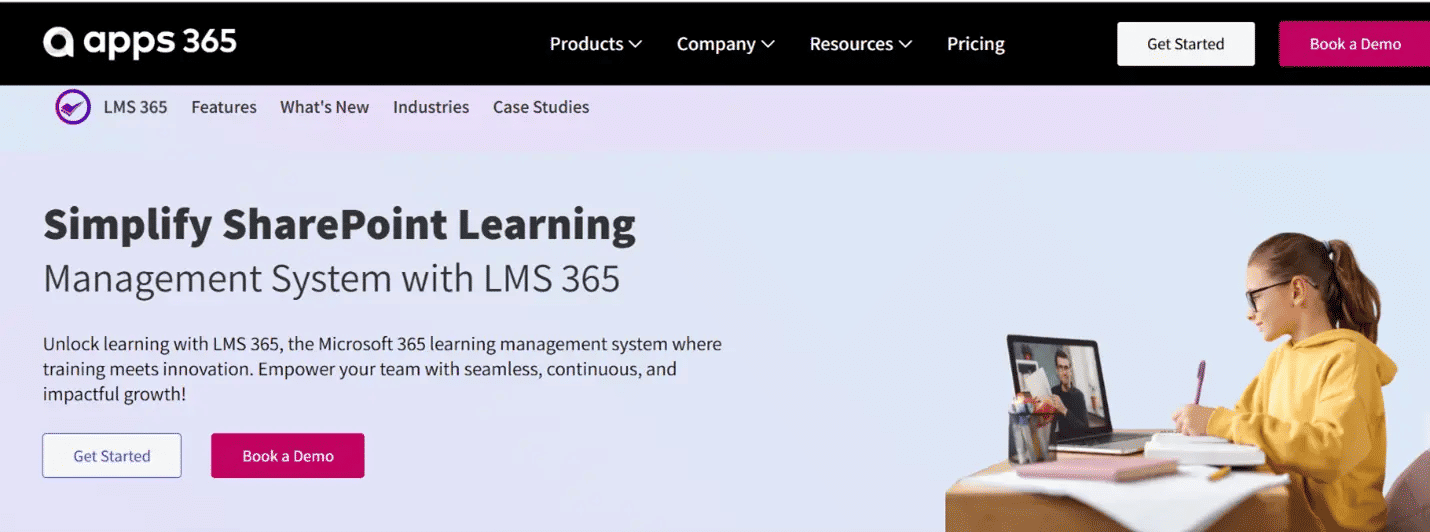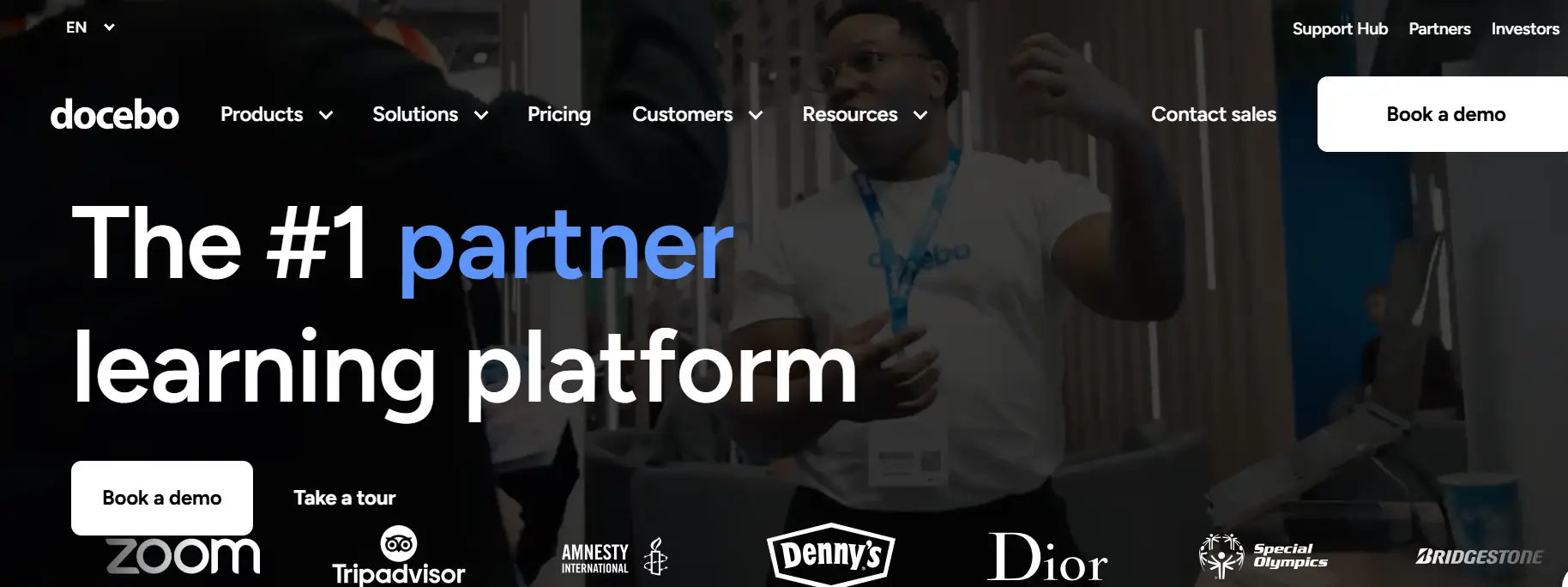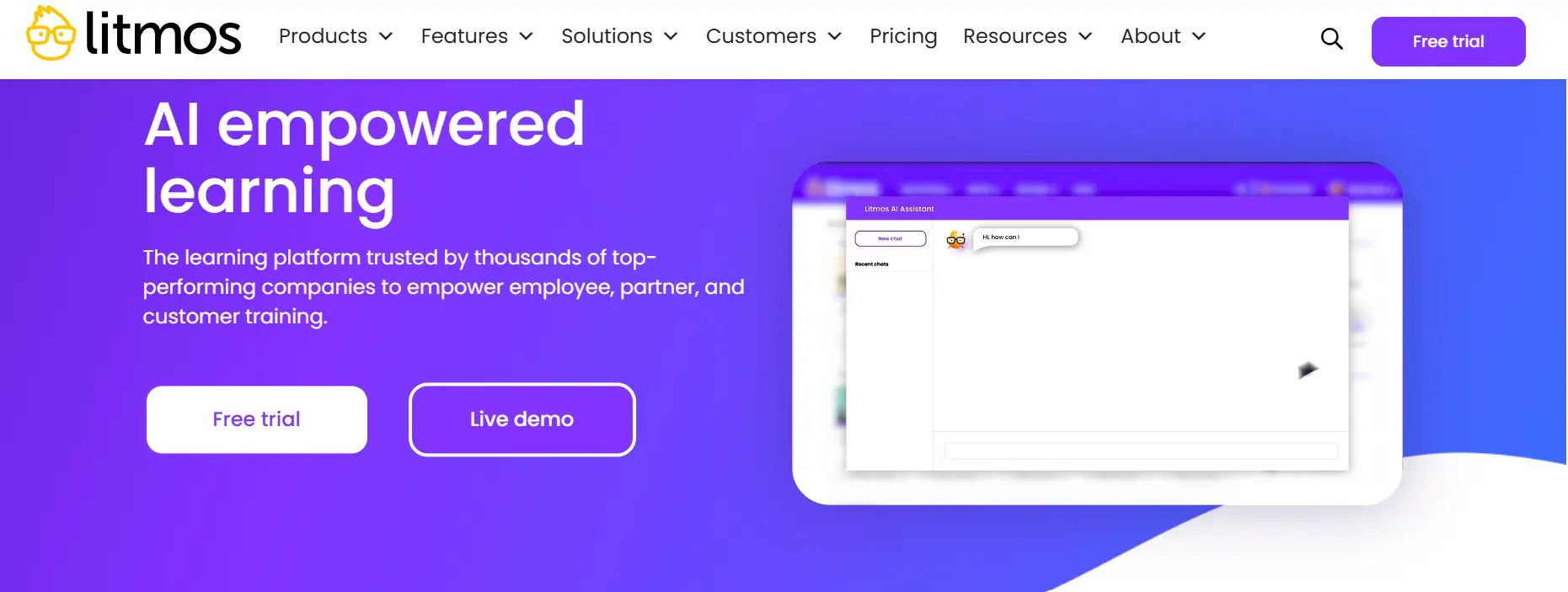
Top 5 HR LMS Platforms for Smarter Training in 2025
The first few days on the job shape how new hires feel, how fast they adjust, and if they see a future in the company. When that experience feels scattered or impersonal, it can push good talent away before they even get started.
✨
Quick Read
Summary generated by AI, reviewed for accuracy.
In 2025, HR LMS platforms are essential for training smarter and faster. They simplify onboarding, track learning, and keep remote or hybrid teams connected through organized, engaging, and easy-to-access training.
Top systems like LMS365, iSpring Learn, Docebo, Litmos, and Absorb LMS help HR teams save time, cut costs, and build a culture of continuous learning. With the right HR LMS, companies boost performance, confidence, and retention—all while growing stronger together.
In 2025, as remote work expands and roles shift faster than ever, employee training has become a top business priority. When people feel their growth matters, they stick around. In fact, nearly 9 out of 10 employees say they are more likely to stay when their company invests in their learning. That kind of investment builds trust and it keeps teams strong.
Yet, many organizations still depend on outdated tools or guesswork to train their people. This leads to low engagement, missed deadlines, unnecessary turnover. That is where a smart HR Learning Management System (HR LMS) makes all the difference.
With an LMS in place, companies can deliver training that feels organized, relevant, and easy to access. It helps new employees get started faster, stay informed, and grow into their roles all while saving time for HR teams.
This guide walks you through five trusted HR LMS platforms that are helping companies train smarter and grow stronger in 2025. Whether your company is scaling fast or leading a large workforce, these tools can help build a stronger, more confident team right from day one.
What is LMS for HR?
An LMS for HR is a learning platform that helps teams manage employee training in one place. It replaces paperwork and manual tracking with simple tools to create courses, assign training, and monitor progress.
It gives HR a clearer way to guide growth, improve learning, and save time.
HR teams use LMS platforms to:
- Onboard new hires with step-by-step training
- Teach workplace policies, safety, and compliance rules
- Develop employee skills with ongoing learning
- Save time by automating repeat training tasks
- Easily see who finished which training and when no guesswork, no chasing.
In short, an HR LMS makes learning easier, faster, and more organized which helps HR teams focus more on people than paperwork.
Why HR LMS Platforms Are Essential in 2025
The way we work keeps evolving. In 2025, jobs are no longer confined to a desk, a building, or even a single time zone. Teams are spread out. Roles are evolving. And learning can no longer be treated as a one-time event.
This is exactly why HR LMS platforms are no longer optional they are essential.
An HR LMS gives teams the tools to share the right training with the right people just when they need it most.
Here’s why HR LMS platforms matter now more than ever:
- Centralized Learning in One Place
No more digging through emails or shared folders. An LMS keeps all your training content videos, quizzes, policies in one easy-to-access space. - Consistent Onboarding Across Teams
Whether employees work remotely, in-office, or across time zones, an LMS ensures everyone starts with the same clear, structured training. - Real-Time Progress Tracking
HR teams and managers can see who has completed training, track performance, and follow up where needed without guessing. - Supports Remote and Hybrid Workforces
LMS platforms make learning flexible. Employees can train from home, while traveling, or between meetings anytime, anywhere. - Saves Time and Manual Work
HR no longer has to chase down tasks training gets assigned, reminders go out, and progress is tracked automatically, giving teams more time to focus on what really matters.
6. Improves Employee Confidence and Performance
People do their best when they understand what’s expected and feel confident in how to get there it builds pride in their work and trust in their role.
7. Strengthens Compliance and Reduces Risk
With an LMS, important training like safety, ethics, or data protection gets done on time and recorded clearly, so nothing slips through the cracks.
8. Makes Learning Continuous, Not Just One-Time
With an LMS, learning goes beyond onboarding. As roles change, it’s easy to keep learning going with refresher courses, skill-building tracks, and fresh content that grows with the team.
9. Data-Driven Decisions
Reports and dashboards give HR a clear view of what’s helping people learn, what needs fixing, and where extra support can make a real difference.
10. Boosts Employee Retention
Employees are more likely to stay when they feel supported in their growth. A good LMS shows that learning and development matter.
Top 5 HR LMS Platforms for Smarter Training in 2025
Explore the top 5 HR LMS platforms transforming employee training in 2025.
These tools simplify onboarding, boost learning, and support team growth.
1. LMS 365

Overview: LMS 365 is built for teams already working with Microsoft 365. It fits right into everyday tools like Teams and SharePoint, so training becomes part of the flow not another system to manage. Easy to access, simple to scale, and designed to meet people where they already work.
Key Features:
- Microsoft 365 Integration: Embeds directly within Teams and SharePoint for a smooth user experience
- Automated Learning Paths: Assign role-based training programs automatically
- Compliance Tracking: Monitor required learning progress with detailed reports
Benefits:
- Delivers training in the tools your team already uses
- Increases learner adoption through familiarity and ease of use
- Simplifies compliance and certification management
Use Case: Best suited for organizations deeply invested in the Microsoft 365 ecosystem, looking to train, track, and engage employees without adding another platform to manage.

Overview: iSpring Learn keeps things simple without cutting corners. Its clean layout and strong features make it a great choice for small and mid-sized teams that need effective training without the hassle.
Key Features:
- Rapid Course Creation: Easily develop interactive courses with quizzes and multimedia
- Mobile Learning: Access training materials on-the-go via mobile devices
- Detailed Analytics: Monitor learner progress and course effectiveness
Benefits:
- Accelerates employee onboarding
- Enhances knowledge retention through interactive content
- Offers scalability to accommodate growing teams
Use Case: A solid pick for teams that want to get their training off the ground quickly simple to set up, yet packed with the tools that matter.
3. Docebo

Overview: Docebo sets itself apart with smart learning tools that adjust to each learner’s pace. It’s a strong fit for larger companies that want to deliver tailored training experiences that truly connect with their teams.
Key Features:
- AI-Powered Learning Paths: Tailors content based on learner behavior
- Social Learning: Encourages collaboration through forums and discussions
- Integration Capabilities: Seamlessly connects with various HR systems
Benefits:
- Delivers personalized training experiences
- Fosters a collaborative learning environment
- Streamlines administrative tasks through integrations
Use Case: Best suited for large organizations looking to leverage AI for dynamic and adaptive learning experiences.
4. Litmos

Overview: Litmos comes ready with a rich library of courses, so teams can roll out training fast. It’s a go-to choice for companies that need to get started quickly without building everything from scratch.
Key Features:
- Extensive Course Library: Access to thousands of ready-made courses
- Compliance Made Simple: Keeps teams on track with required training, so nothing important gets missed when it comes to rules and policies.
- Real-Time Insights: Shows how learners are doing as they go—making it easier to spot progress, struggles, and opportunities to improve.
Benefits:
- Speeds up training implementation
- Reduces content development time
- Maintains compliance across various sectors
Use Case: Ideal for organizations needing immediate access to a wide range of training materials without the hassle of content creation.
5. Absorb LMS

Overview: Absorb LMS brings together a clean, easy-to-use design with all the tools needed to run effective training. It’s built for businesses that want learning to feel smooth for both employees and admins.
Key Features:
- Customizable Interface: Aligns with company branding
- Mobile Compatibility: Ensures learning on any device
- Clear Training Insights: Helps you see what’s working, what is not, and where to improve so learning stays meaningful and on track.
Benefits:
- Keeps learners interested with a layout that’s easy to navigate so they can focus on learning, not figuring out how to use the system.
- Provides flexibility with mobile learning options
- Enables data-driven decisions with comprehensive analytics
Use Case: Suitable for organizations seeking a balance between aesthetics and functionality in their training platform.
Importance of LMS for HR Professionals
Managing training without a proper system can quickly become overwhelming. Between tracking spreadsheets, chasing email threads, and reminding people to finish training, HR teams often get buried in busywork leaving little room to focus on people and long-term goals.
Below are key reasons why an LMS is essential for HR teams in 2025 and beyond:
- Keeps Everything in One Place
A well-designed LMS organizes courses, certifications, records, feedback, and learning paths in one secure system. It eliminates the need to juggle multiple folders, platforms, or email trails everything is accessible with just a few clicks. - Saves Time on Daily Tasks
No more juggling spreadsheets or chasing reminders. With automated workflows in place, HR teams can stop getting buried in tasks and start focusing on what truly matters helping people grow and building a stronger workplace. - Ensures Equal Learning Opportunities
Whether an employee works from a remote village or a corporate office, they receive the same quality training. LMS platforms promote fairness by delivering consistent content regardless of time zone, location, or role. - Supports Employee Growth and Career Development
With access to leadership programs, skill-building modules, and career path courses, employees can continuously learn and grow. An LMS makes it easier to shape growth paths that fit each person’s role and potential helping teams grow their own leaders instead of looking outside. - Strengthens Compliance and Reduces Risk
Important courses like safety, conduct, and privacy get delivered on time and to the right people. Since everything is recorded in one place, it’s simple to see who completed what, making it easier to stay audit-ready and avoid any last-minute compliance surprises. - Improves Onboarding Experience
New hires can hit the ground running with pre-assigned modules, welcome videos, and department-specific guides. LMS onboarding builds confidence, speeds up integration, and makes first impressions count. - Tracks Learning Progress with Ease
Live dashboards give a clear view of who’s moving forward, who might need extra help, and where the learning experience could use a boost. This helps HR spot issues early and adjust content or provide extra support where needed. - Boosts Employee Retention
When people feel supported in their growth, they’re more likely to stick around. Offering training shows you’re invested in their future and that builds loyalty, trust, and a stronger team. - Increases Training Consistency Across Departments
With an LMS, every team stays on the same page while still getting training that fits their day-to-day work. It brings consistency without losing relevance. This keeps everyone aligned without compromising flexibility. - Simplifies Reporting and Documentation
Generating training reports for leadership or audits becomes quick and hassle-free. HR professionals can access course completions, certifications, and scores instantly, saving hours of manual entry. - Offers Flexibility for Remote and Hybrid Workforces
Whether someone’s at a desk or on the move, an LMS makes learning easy to access on any device so they can pick it up anytime, anywhere, and go at their own pace. It removes barriers and makes learning fit into busy schedules. - Makes Learning More Engaging
Interactive quizzes, gamified challenges, video learning, and badges keep employees motivated. LMS platforms turn training into a meaningful, enjoyable experience not just another task. - Adapts to Changing Business Needs
As company goals shift, HR can update content, create new modules, or launch new training campaigns instantly. LMS platforms grow and adapt with the business. - Enhances Collaboration Between HR and Managers
Managers can monitor team training, assign department-specific courses, and support development goals. It turns learning into a shared responsibility between HR and leadership. - Supports Cross-Skilling and Internal Mobility
With LMS, HR can offer cross-training opportunities, helping employees explore different roles and build new skills. This supports internal hiring and career path planning.
When a company invests in helping people grow, they tend to stick around nearly all employees say learning opportunities make them want to stay longer. For HR professionals, that makes LMS not just a tool but a critical part of building a more capable, confident, and committed workforce.
Benefits of Implementing an HR LMS
Bringing in an HR Learning Management System is a practical step forward for today’s HR teams making training easier to manage and more impactful for everyone. It brings structure, speed, and insight into employee development while saving both time and resources.
- Streamlined Onboarding
An LMS helps automate the entire onboarding process. From welcome messages and role-specific content to compliance modules, everything is pre-assigned and easy to access. This ensures every new hire gets the same clear, timely experience, reducing delays and confusion in their first few days. - Enhanced Compliance
It is easy for important compliance training to slip through the cracks unless there is a clear system in place to keep it on track.An LMS ensures employees complete required safety, ethics, or regulatory courses on time. It also stores certificates and tracks completions, which helps during audits and reduces the risk of penalties or legal issues. - Improved Employee Engagement
When training includes videos, quizzes, and a bit of fun, people pay attention. It keeps them interested, helps them absorb more, and makes learning feel like progress not a chore. - Data-Driven Decisions
HR teams can track learner progress, quiz scores, time spent on modules, and completion rates. These insights help identify skill gaps, refine course content, and personalize learning plans for better results. - Cost Efficiency
An LMS cuts down the need for printed materials, travel, venue bookings, and instructor-led sessions. It also reduces the time HR spends managing training manually. Over time, this leads to significant cost savings while still delivering high-impact learning. - Scalability for Growing Teams
As your team grows, the right LMS grows with it without adding extra stress or chaos. It supports bulk enrollments, automated learning paths, and department-specific training without additional admin effort. - Centralized Training Management
All training content from onboarding to leadership development lives in one organized system. HR can assign, track, and update programs easily, ensuring nothing falls through the cracks. - Anytime, Anywhere Learning
Employees can access training at their convenience at home, during a break, or while commuting. This flexibility supports remote teams, global offices, and busy schedules without disrupting productivity. - Faster Time to Productivity
When new hires get the right training fast, they become confident and effective sooner. With the right structure in place, new hires find their footing faster and feel ready to contribute sooner. - Supports Career Growth and Internal Mobility
LMS platforms offer role-based learning paths, leadership tracks, and optional skill-building courses. This empowers employees to grow within the organization and opens doors to internal promotions. - Consistent Learning Experience
Whether someone is in sales, HR, or IT, LMS ensures they receive consistent training aligned with company values, expectations, and quality standards. - Easier Performance Tracking for Managers
Managers can view training progress, monitor team development, and assign department-specific modules. It keeps everyone aligned on goals and growth. - Strengthens Company Culture
An LMS helps communicate company values, expectations, and mission through tailored content. It helps everyone feel connected and aligned something remote and hybrid teams often need the most.
Best Practices of HR LMS
To get the most out of your HR Learning Management System, it is important to follow a few best practices. These not only improve training outcomes but also increase employee engagement and long-term retention.
- Align Learning Goals with Business Objectives
Ensure that your training programs support your company’s overall goals. Whether it is compliance, productivity, or leadership development, your LMS should reflect what matters most to your organization. - Personalize the Learning Experience
Not all employees learn the same way. Offer flexible learning paths, mix content types (videos, documents, quizzes), and allow self-paced options to meet individual needs. - Keep Content Relevant and Up to Date
Outdated training reduces effectiveness. Regularly review and refresh your LMS content to ensure it stays accurate, current, and aligned with your company’s processes. - Encourage Continuous Learning, Not Just One-Time Training
Use the LMS to offer ongoing development opportunities. Add microlearning, monthly training updates, or optional skill-building courses that keep employees growing over time. - Use Analytics to Improve Learning
Take advantage of your LMS’s reporting tools. Look at metrics like completion rates, quiz scores, and feedback to refine your content and identify where learners need more support. - Integrate with Other HR Tools
Choose an LMS that works well with your HRIS, payroll, and performance systems. Integration saves time, reduces manual entry, and keeps employee records complete and connected. - Make It Mobile-Friendly
People learn best when it fits their schedule whether it’s at their desk, on the go, or after hours. A mobile-compatible LMS makes learning easier for field workers, remote staff, and global teams. - Promote Training Across the Organization
Do not assume everyone will log in on their own. Use internal announcements, email reminders, and team leads to promote learning opportunities and boost participation.
Conclusion
Investing in the right HR LMS platform is pivotal for organizations aiming to enhance their training processes, ensure compliance, and foster a culture of continuous learning. By understanding the unique features and benefits of each platform, businesses can make informed decisions that align with their goals and workforce needs.
Ready to transform your organization’s training approach? Let’s find the right fit together book a quick demo and see how these HR LMS tools can support your team’s growth and goals.
Join Our Creative Community
Frequently Asked Questions
What is an HR LMS?
An HR Learning Management System is a simple, central place where teams can create, share, and keep track of employee training from day one through every stage of growth.
How does an HR LMS benefit small businesses?
It streamlines training processes, reduces costs, and ensures consistent onboarding and compliance training, even with limited resources.
Can HR LMS platforms integrate with other systems?
Yes, most modern HR LMS platforms offer integrations with HRIS, CRM, and other enterprise systems for seamless data flow.
Is mobile learning supported in these platforms?
Absolutely. Platforms like App365 offer mobile compatibility, allowing employees to access training materials anytime, anywhere.
How do I choose the right HR LMS for my organization?
Consider factors like company size, training needs, budget, and desired features Trying out a demo or test run is a smart way to see if the platform truly fits your team’s needs before making a decision.
Blog Categories
Power Productivity—Start Today
All Your Work, One Smart Platform
Your Team's New Favorite Workspace
Organize, Collaborate, and Thrive—For Free




_JiluXJRGNl.svg)























